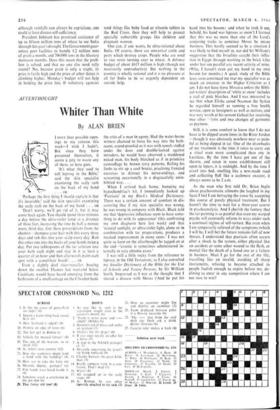AFTERTHOUGHT
Whiter Than White
By ALAN BRIEN
I HAVE four possible open- ings to my column this week-I wish I hadn't. But since they have presented themselves, it seems a pity to waste any of them, so here goes.
'It's what they used to call leprosy in the Bible,' said the skin specialist examining the scaly rash on the back of my hand . . . OR 'Perhaps the first thing I should explain is that it's incurable,' said the skin specialist examining the scaly rash on the back of my hand . . . OR 'Don't worry, we'll get rid of it, but it may come back again. You should spend three minutes a day before the ultra-violet lamp at a distance of three feet, increasing the time by half a minute every third day. Get these prescriptions from the chemist-shampoo your hair with this every three days and rub this into your scalp every day. Rub this other one into the backs of your hands twice a day. Put two tablespoons of the tar solution into your bath each night and stay in it at least a quarter of an hour and then afterwards paint each spot with a camel-hair brush'. . . OR
Even a slightly deaf river-traveller, boating down the swollen Thames last weekend below Cookham, would have heard emerging from the bathroom of a small cottage on the Cliveden bank the cries of a man in agony. Had the water-borne witness chanced to force his way into the bath- room, sound-proofed as it was with towels stuffed under the door and double-locked against intruders, he would have observed a maddened naked man, his body blotched as if in primitive camouflage by brown tarry patterns, flailing his limbs to stir up a cool breeze, practising frenzied exercises to distract his nerve-endings, and screaming occasionally in a disgracefully unin- hibited way.. . .
When I arrived back home, humping my hypochondriac's kit, I immediately looked up 'Psoriasis' in my Black's Medical Dictionary. There was a certain amount of comfort in dis- covering that if my skin specialist was wrong, he was wrong in company with Black. Black told me that 'depressive influences seem to have some- thing to do with its appearance' (this confirming my own diagnosis here last week) and that 'natural sunlight, or ultra-violet light, alone or in combination with tar preparations, produces a marked improvement in many cases.' I was not quite so keen on the afterthought he tagged on at the end-`arsenic is sometimes administered in- ternally in very chronic cases.'
I was still a little rocky from the reference to leprosy in the Old Testament, so I also consulted my Smaller Dictionaq of the Bible for the Use of Schools and Young Persons, by Sir William Smith. Impressed as I was at the thought that I shared a disease with Moses ('And he put his hand into his bosom : and when he took it out, behold, his hand was leprous as snow') I learned that this was no more than one of the Lord's conjuring tricks to convince Moses he meant business. This hardly seemed to be a situation I was likely to find myself in, nor did Sir William's suggestion that the Israelites caught their inflic- tion in Egypt through working in the brick kilns under hot sun parallel any recent activity of mine. (Why, I haven't even put my hand in my own bosom for months.) A quick study of the Bible texts soon convinced me tnat my specialist was as much an amateur in the Higher Criticism as I am. I do not have lepra Mosaica unless the Bibli- cal writers' description of 'white as snow' includes a trail of pink blotches. And I was interested to see that when Elisha cured Naaman the Syrian he regarded himself as running a free health service, open to foreigners as well as natives, and was very wroth at his servant Gehazi for receiving two silver -Oents and two changes of garments as payment.
Still, it is some comfort to know that I do not have to be dipped seven times in the River Jordan -though it was obviously nowhere near as pain- ful as being dipped in tar. One of the drawbacks of my treatment is the time it takes to carry out a ritual even more complicated than any in Leviticus. By the time I have got out of the theatre, and eaten in some establishment still open to lepers, it is midnight. And by the time I crawl into bed, smelling like a new-made road and collecting fluff like a cashmere sweater, it always seems to be 2 a.m.
As the man who first told Dr. Brian Inglis about psychosomatic ailments (he laughed in my face) I feel I am betraying the cause by accepting this course of purely physical treatment. But I haven't the time to wait for a three-year course in psychoanalysis. And I cherish the fantasy that the tar-painting is so painful that even my warped psyche will eventually reform its ways under such a continual regime of self-torture. But even when I am temporarily relieved of the symptoms (which I will be, I will be) the future remains full of new threats. I understand that psoriasis often occurs after a shock to the system, either physical like an accident or some other wound to the flesh, or mental like the death of a loved one or a failure in business. Must I go for the rest of my life, travelling like an invalid, avoiding all sharp instruments, refusing to become attached to people foolish enough to expire before me, de- clining to enter in any competition where I am not sure to win?


































 Previous page
Previous page